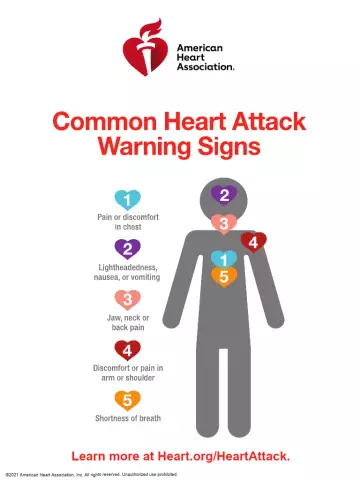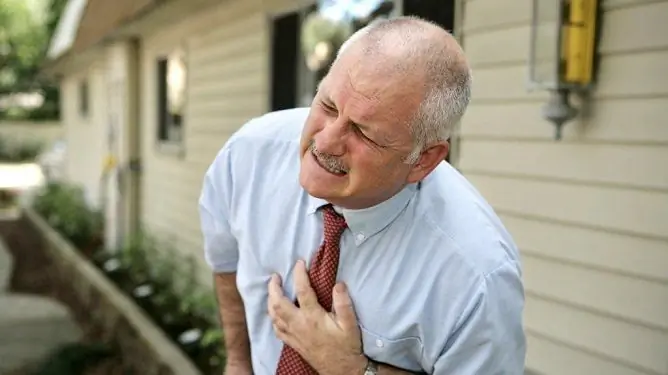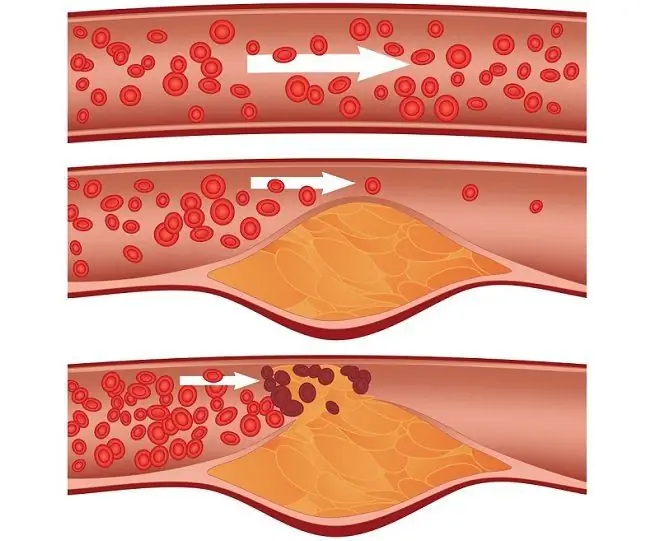- Author Rachel Wainwright wainwright@abchealthonline.com.
- Public 2023-12-15 07:39.
- Last modified 2025-11-02 20:14.
Signs of a heart attack in men: symptoms, warning signs
The content of the article:
- Symptoms of myocardial infarction in men
- What to do when signs of a heart attack appear
- What can cause a heart attack in men
- Preventing re-infarction
- Video
The symptoms of a heart attack in men and women may differ, which is associated with hormonal as well as constitutional differences. In men, obturation of large arteries occurs more often, the affected area is better visualized during angiography. The symptoms of the disease are manifold, which can make it difficult to make a diagnosis.
Myocardial infarction is an acute clinical form of ischemic heart disease, when, due to impaired blood supply, necrosis of one or more areas of the heart muscle occurs, followed by the formation of a scar.
The area of the myocardium, which underwent necrosis and then scarring, does not recover and does not perform its functions, which worsens the work of the heart, and with a large size or location in a certain anatomical region, it becomes the cause of the development of heart failure. A massive heart attack is often fatal. How long they live after a heart attack depends on the extent of the lesion of the heart muscle, the presence of complications, as well as the timeliness of medical care provided and the patient's compliance with medical prescriptions.

The main symptom of a heart attack is severe heart pain, which is not eliminated by pain medications.
First of all, people from the risk group and their relatives should be aware of the possible symptoms of myocardial infarction and the rules of first aid.
What to do if you suspect a heart attack? When signs of a heart attack appear in men, the first thing to do is call an ambulance, even if there is no complete confidence in the diagnosis. Treatment at home is impossible, his attempts are highly likely to end in death or, at best, disability of the patient.
Symptoms of myocardial infarction in men
Forerunners may indicate an approaching heart catastrophe:
- increasing weakness, drowsiness and increased fatigue;
- feeling short of breath, shortness of breath;
- numbness of the limbs, tingling in the limbs;
- dizziness, which may be accompanied by short-term loss of consciousness;
- a sharp drop in blood pressure;
- increased sweating;
- cyanosis of the skin;
- rapid pulse.
Such warning signs usually appear 3-7 days before a heart attack, but can occur from time to time and for a month and a half. As a rule, they are short-lived, and therefore often do not pay attention to themselves.
The first sign of a heart attack that has begun is a sudden intense chest pain in the region of the heart, which lasts more than 10 minutes and is not relieved by conventional pain medications. The pain can be squeezing, burning, wavy, it radiates to the arm, shoulder blade, jaw, perineum, and in men it often extends to the right half of the body. A painful attack is accompanied by disorientation, increased heart rate, heart sinking, dry cough, cold sweat, panic, fear of death. Sometimes in patients without a history of hypertension, blood pressure rises.
Myocardial infarction can be atypical. In the presence of atypical symptoms, a heart attack may be mistaken for another pathology and not diagnosed in a timely manner. This variant of the disease is more common in women, but it is not excluded in men, so it is advisable to know its possible signs.
Atypical manifestations of myocardial infarction can be: pain in the jaw on the left, toothache, pain in the neck, left side of the body, asthmatic suffocation, fever, heartburn, nausea and vomiting, pain in the stomach, pain in the arm (often in little finger).

The diagnosis can only be reliably established in a hospital.
Cardiac infarction in patients with diabetes mellitus may occur without characteristic chest pain or have no pronounced symptoms at all, manifested by weakness, depression and anxiety. Signs of a painless heart attack, which is carried on the legs, can be a sudden violation of the heart rhythm, a sharp drop in blood pressure, pulmonary edema.
What to do when signs of a heart attack appear
For any signs that indicate a possible impending heart attack, an ambulance should be called immediately. Before her arrival, the patient is given first aid. The patient must be laid on a hard surface, provide access to fresh air. If there is a doctor's recommendation, the patient should be given medications, for example, Nitroglycerin. If possible, measure the patient's pressure (report the results to the doctor), prepare documents that may be needed in the future (passport, policy, results of previous studies). It is necessary to stay with the patient until the ambulance team arrives.
Prompt (no later than 12 hours after the onset of the first symptoms) provision of medical care to a patient with a heart attack reduces the risk of adverse consequences.
It is possible to recognize the disease with absolute certainty only in a hospital, the diagnosis is confirmed on the basis of electrocardiography. Echocardiography and a biochemical blood test may be needed for clarification.
What can cause a heart attack in men
Recently, myocardial infarction is increasingly recorded in young people. If earlier signs of a heart attack were usually diagnosed in men over 60 years old, in recent decades, the disease has been more and more often recorded in men after 30 years. According to statistics, men in the 40-60 age group are most vulnerable to heart attack. After 40 years and up to 60, the likelihood of a heart attack increases, then begins to decrease, and at 70 years of age, heart attacks are diagnosed much less often. The reason is that with frequent attacks of angina pectoris, collateral vessels are formed, which are activated in case of circulatory disorders in the central arteries. In men over 50, the incidence of heart attack is the same as in women in this age group.
The most common causes of heart attacks in men include atherosclerotic lesions of the blood vessels. Often, the pathological process develops in the presence of a genetic predisposition, kidney disease (with damage to the renal glomeruli), arterial hypertension, and endocrine disorders.
A passive lifestyle, chronic stress, unbalanced diet, alcohol abuse, overweight, high blood cholesterol levels contribute to the onset of a heart attack. One of the main risk factors for the development of myocardial infarction is smoking, which leads to microtrauma to the lung tissue, subsequent thrombus formation and blockage of the coronary arteries. The risk of developing myocardial infarction increases in the spring-autumn period.
Preventing re-infarction
In the acute period of a heart attack, the patient should adhere to a strict diet, which will prevent the development of complications and avoid a second attack. It is advisable to coordinate the menu with the attending physician.
Patients with myocardial infarction are shown fractional meals (5-7 times a day in small portions). The menu of such patients is recommended to include vegetable soups, dairy products, cereals, vegetables, fruits and berries, pasta, lean meat and fish, seafood, weak broths, greens, nuts, dried fruits. Fatty meats and fish, sausages, smoked products, strong coffee and tea, and alcoholic beverages are excluded from the diet. Limit salt intake. The diet should be followed not only during the treatment and rehabilitation period after a heart attack, but also to adhere to proper nutrition in the future.

Patients who have had a heart attack should be seen by a cardiologist
In order to prevent heart attack and other cardiovascular diseases, it is necessary to abandon bad habits, avoid physical and mental overload, lead an active lifestyle, normalize body weight, and observe a drinking regimen.
Blood pressure control and regular monitoring by a cardiologist are of great importance for people at risk. Bypass grafting, stenting or angioplasty can be used to prevent a heart attack when the lumen of the vessels is narrowed.
Video
We offer for viewing a video on the topic of the article.

Anna Aksenova Medical journalist About the author
Education: 2004-2007 "First Kiev Medical College" specialty "Laboratory Diagnostics".
Found a mistake in the text? Select it and press Ctrl + Enter.






